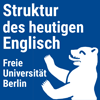8.1 Homework
During this week’s seminar we started exploring irregular inflection of a) nouns and their plural forms and b) adjective and their comparative and superlative forms. For next week, I would like you to continue with this at home so that we can discuss this next week. So here are the two topics and three steps again that are involved
- Brainstorm inflectional patterns, start to categorize them, consult background literature about common categorizations. Gather prescriptive ‘rules’ and descriptive regularities.
- Do some research into the emergence of the irregular forms. Consult etymological dictionaries (e.g. the OED). Get an overview over potential tendencies.
- Do some exploratory corpus search.
Build on your work during the seminar. The aim for next session is to develop research questions based on these overviews.
8.1.1 Tip of the Day
Today: Multitasking
Learning an academic discipline takes a lot of time and focus. However, some aspects are like learning a language or motor skills. It might sound weird, but knowledge, especially theoretical, is like a muscle you can train. So here is my suggestion for how to get better at Linguistics or Literary Studies or whatever science you are interested in: Listen to lectures, talks, podcasts and other content in the background.
Great topics to passively consume are:
- Theory, e.g. Cognitive Linguistics
- Philosophy of Science, highly interesting, vastly important, but oft neglected
- Sciences that are not your major
Here are some activities I frequently use to bombard myself with knowledge.
- weight or endurance training
- practicing an instrument (especially repetitive technical exercises)
- cooking
- cleaning, tidying, building Ikea tables ;)
Non of these activities require your full mental focus or have long pauses, so your thoughts are free to meander through the depths of science. Nowadays, a lot of talks or even full lectures can be found online, and with online teaching taking off right now there will be ever more.
Linguistics
Luckily, we are not the only university trying to teach you linguistics online. Here are some nice channels to binge watch both actively and passively.
- Martin Hilpert: Has a variety of lectures and full courses on all things linguistics.
- The Virtual Linguistics Campus: Old but gold.
- People without YouTube channels, but who are great lecturers, Adele Goldberg, Joan Bybee, George Lakoff, Geoffry Pullum. I have found many of their lectures and interviews online on various channels and platforms.
- NativLang: Probably my favorite language channel. Animation videos on a variety of language related topics. Focus on Cross-Linguistics.
Other sciences
If you are a curious person, and if you appreciate the academic endeavor, chances are you are interested in other sciences, too. Knowing subjects outside the social sciences may help you in unexpected ways. Here are my go-to channels to listen to in the background.
- mailab: Focus on (bio-)chemistry, but mostly deals with current debates on the media. You can learn a lot about how news outlets interpret and sometimes misrepresent scientific studies.
- PBS Space Time: Astrophysics. Popular science without the usual dumbing down. Great stuff to listen to even if you understand nothing. :D
- Closer to the Truth: Philosophy. Dealing with the big questions. How do we know facts? Why should we trust in Science? What are hypotheses and theories and why bother?
- Statquest: Pleasantly cringey statistics videos.
- zedstatistics: More in depth. (Less cringe. :( )
- 3Blue1Brown: Mathematical concepts with animations instead of formulae. I was horrible at maths in school but I always had a sense that it is actually a very beautiful subject. Wish I had visualizations like these back then.
- Computerphile: Various computer science topics
I have not yet explored the world of audio books and audio podcasts, but I’m sure there is a lot of great stuff out there.
If you discover anything, let me know! :)

